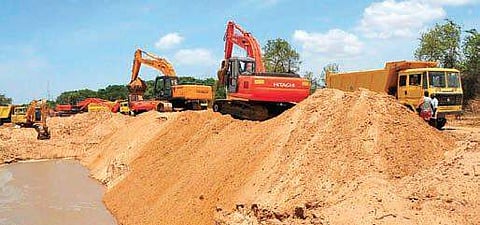

KANNIYAKUMARI: Several unfounded rumours are spreading on social media about beach sand mineral (BSM) mining activities of IREL (India) Limited, a top official of the IREL plant in Manavalakurichi said.
Referring to the opposition raised to the plant's proposed BSM excavation on 1,144.06 hectares of land in Kanniyakumari villages, he added, "Many are claiming that the chemical washing process pollutes the groundwater. But, IREL engages in processes to physically segregate minerals, including wet gravity separation, electrostatic separation, and high and low-intensity magnetic separation. No chemical-based application is involved in mineral separation. Moreover, groundwater is not extracted for the process as abundant fresh water sources are available nearby."
As per IREL, their proposed excavation in Kanniyakumari would involve immediate backfilling, topography restoration and plantation. "After extraction of 12%-14% of minerals, the remaining tailings will be returned back for topography restoration. No drilling and blasting of explosives will take place. The habitation and the built-up area falling within the mining lease area will not be disturbed, and mining will be taken up only if the owners agree to lease out their lands for mining. The owners will receive at least Rs 40 lakh per acre if they accept the lease agreement. No privateer will be forced to give their land for mining," the official reiterated.
One of the major apprehensions among the public is that BSM mining and the separation of heavy minerals would increase the radiation levels in the region. Dubbing it as a baseless rumour being spread on social media, the official said radiation levels would significantly reduce in the region after mining, as the silica tailings restored at the mined site will be void of radiation-causing minerals. "All vegetation, including coconut trees, would grow well in the restored area," he added
As per the periodic environmental survey of the Health Physics unit, Health Physics Division of BARC using an instrument RaDEye, the measurement of radiation levels recorded before BSM mining and after restoration with silica tailings shows a significant reduction, the official further said. For instance, the dose rate of 14.1 uSv/h (microsieverts per hour) recorded at Parapattu beach near Colachel before mining BSM, had drastically reduced to 0.24 uSv/h after mining, he said.
Experts say that 1,000 microsieverts (uSv) make one millisievert (mSv). The annual dose limit for an individual is one millisievert and it is 20 mSv for workers exposed to radiation. "Radiation sickness appears at 1,000 millisieverts and mortality occurs at the threshold level of 2,000 millisieverts. Acute or prolonged overexposure to radiation may result in cancer, life-shortening and genetic disorder," said IREL experts requesting anonymity.
On the rumours of the acquisition of private lands for mining activity, the official said no land will be acquired for the project under the Right to Fair Compensation and Transparency in Land Acquisition, Rehabilitation and Resettlement Act, 2013. "IREL adopted an internal policy in 2010 to take lease of private lands for pursuing mining activity for a period of 11 months and to return the land after restoring its topography," he explained.
Speaking to The New Indian Express, Federation of Indian Placer Mineral Industries member advocate John Solomon said the charges levelled against IREL are baseless. "IREL's operations are in the public domain and accountable, unlike other private mining companies. People with vested interests are behind the purported misinformation about IREL's mineral separations. They are taking advantage of the ignorance of common people," he said.